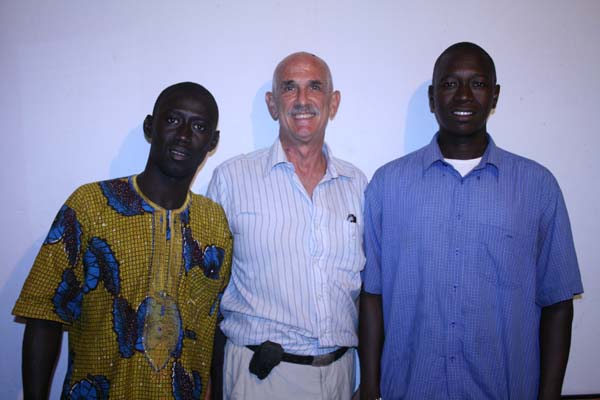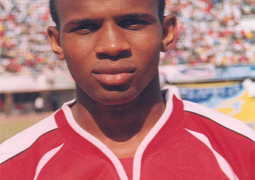
The West African Medicine and Education (WAME) is set up by an American Doctor with his Gambian "brothers" to assist communities in the areas of health, education and helping nurses and health centres in rural areas, so as to help others in need. It is an organisation geared towards the improvement of the lives of needy people in The Gambia. They pay fees for many poor children, and help villages a lot.
Society and Development would tell you in detail what this vibrant NGO stands for and what they are doing to improve on what they do.
Ebrima Marong and Dr. David Levine agreed to answer questions on WAME.
S&D: Would you please tell me a bit about your team on WAME?
Dr. David: We have Ebrima Marong who serves as the Administrator, while Sam Amako serves as the Chief Financial Officer (CFO), Lamin Jawara serves as the IT specialist and I Dr. David Levine, as the head of the organisation. We have a very efficient board manned by responsible people in society.
S&D: When and how did you start WAME?
Dr. David: I came first to The Gambia in February 2006, and worked as principal physician in the Accident and Emergency Department at the Royal Victoria Teaching Hospital for a year. At that time my Gambian "brother" Ebrima Marong and I started what was at first an informal charity which has now become a charity incorporated in The Gambia, the West Africa Medicine and Education (WAME.) So we started it in 2006.
S&D: Have you any memorandum with any important body of the country or outside?
Dr. David: We have signed Memorandum of Understanding with both the Ministry of Health and Social Welfare and the Ministry of Basic and Secondary Education. And we expect to be officially registered this June, when the NGO Affairs Committee meets. NGO Affairs has indicated that there is no reason why this should not be granted.
S&D: What is your aim about WAME?
Dr. David: Our aim is to help out the medical infrastructure in whatever ways possible.
For example, we have imported cases of medical equipment and supplies.
We completed installation of a new plumbing system in the clinic up-country at Illiassa village. The nurses can now wash their hands at a sink with running water between patients.
The mums in the maternity building can bathe their new babies and use flush toilet without having to go 50 metres to an outhouse. The staff now has showers and running water in their kitchen sinks.
We installed screening on the windows at the Jappineh clinic. It is to enhance the decrease in malaria as research has shown that screening is effective, low cost and low tech. Illiassa will receive the same in the next two weeks.
We just provided funds to the Village Development Council in Noo Kunda to begin construction of an outpatient building, to be used as a waiting area, as well as for teaching, immunisation and well baby clinics.
We were instrumental in arranging cardiac valvular surgery in the UK for a 13-year-old Sierra Leonean refugee boy. Most of our individual interventions aren?t nearly so dramatic. Providing medication for an old person is just as important.
S&D: Have you any more accomplishments at all?
Ebrima Marong: Yes, we have even more in the past and present. We have provided at the RVTH a heavy-duty air conditioner at A&E, High-quality ceiling fan, new lighting throughout the department of A&E, 400 sets of reading glasses at the eye clinic, surgical supplies and equipment to the major theatre, stethoscopes and BP machines to nurses, more than 1000 blood sugar test strips donated.
At the Farafenni Hospital, we donated Nikon binocular microscope, 94 pair of reading glasses. At Illiassa Clinic, we installed plumbing with washbasins, toilets, showers etc. in all four buildings of the facility, funding window screening to keep out flies and mosquitoes.
We supplied a nebulizer machine to treat asthma patients. At Noo Kunda Clinic, we are funding construction of new outpatient building. At Howard Dalton Memorial Clinic at Jappineh, we have funded window screening to keep out flies and mosquitoes. And at Sintet Clinic, we provided nebuliser machine to treat asthmatics. We provided hospital uniforms and medical supplies. We donated new toilet to Kunkujang Clinic.
Under education, we are sponsoring sixteen needy kids in different areas of the country. The number will increase next year as we have several applications with us already.
Our target is mainly the junior and senior groups as some parents are really needy. We are also helping with the funding of tutoring kids struggling with subjects.
We help individual parents to secure needed medical and surgical care and are funding students repeating the WAEC examinations.
We are funding a 17-year-old girl whose father had died and the mum could not afford to pay for her in the high school. We are particularly interested in assisting girls to be educated.
S&D: Have you any mentor in your activities?
Dr. David: Yes! The President has done quite a lot to empower women in this overwhelmingly Muslim country. The Vice-President is a woman as are many people in reasonably high positions in the government, with a significant number of female members of the National Assembly.
S&D: What about financing your many projects, how do you get funds?
Dr. David: Our finances are mostly from individual donors
S&D: Any constraints in your funding?
Dr. David: Yes, there are. A generous foundation funded us from US last year and they decided to ?borrow? more than a third to ?pay us back later.? And the foundation cautioned us that they usually don?t fund anyone twice in a row, urging us not to count on their funding this year.
It is now seven months we have not seen anything.
S&D: Is there any other pending and urgent issue you should intervene in?
Ebrima Marong: Yes dear, we have a burnt up girl, whose hands have clipped to the body. She needs overseas help to survive it. We are looking for sponsor for an operation.
S&D: Is there anything for the government and medical situation?
Dr. David: The government is doing a wonderful job with the house-to-house immunisation. Primary prevention is even more important than given pills. Health care goes beyond the provision of cure to the prevention. For example, a donkey driver drives his donkey at night without a reflector; he is knocked down and killed. Safety campaign should be intensified starting with the schools. The seat belt law is quite good too. Motor cycles should have its headlights on and helmet. Bicycles, trucks too should have reflectors. There is a tremendous potential in The Gambia:
S&D: How are you received in the villages?
Dr. David: We are received with open arms and we feel very delighted. We met the village committees with about 40 people: women and men spoke out and we realised their needs.
We are now building a waiting room for nursing mothers, although the clinic is not operational at the moment.
S & D: What about Gambian sponsors?
Dr. David: Gambian corporations and businesses have been disappointing? with an exception of a few. I expect them to be forthcoming, but that has not been the case.
S&D: Have you meet any of the corporate body?
Dr. David: Yes! We met with Standard Chartered Bank.
It was very cordial they indicated an interest in collaborating with us, but not yet. We look forward to them.
S&D: Any one to thank?
Dr. David: Of course! Thanks to the Ministry of Health, Ministry of Education, Commissioner of Customs, Mr. Trawally A. Banna Company, Takaful, Gamtel, the Sand Family Fund of the US, African Oister Trust, which is spear headed by Lady Kira Dalton.
S&D: Any last words Ebrima?
Ebrima Marong: I am happy and proud to be part of WAME. It will take my country forward. Our president says, "Gambia can be only developed by Gambians."I am trying to help youth be involved in nation building. WAME is here to stay.
Its operation does not look at gender, tribe or region, we are here to take the country forward.
President Jammeh's empowerment of women impresses me so much."
S&D: And you, Dr. David:
Dr. David: "We hear the government's priority is on health and education. We are here to complement his effort. I have seen tremendous changes in four years. We need capacity building in training nurses and retaining them. They are the heart and soul of the health care system. We are happy that we coordinate with other NGOs."
We connect needy people if we can't we involve other NGOs to step in.
My work at A & E Department gave me first hand knowledge of the sorts of things needed.
I have taken no salary and I live with my local families and we use my 20-year-old Montero and my motorcycle.
S&D: Thanks brother.
Both: You're welcome.


